Daily Global Market Outlook
HUI Poised to Break Out
14 June 2003
a currency & gold market analysis
by Ed Bugos
| Print Copy | ||
| Today's Highlights: | ||
| Freddie risks played down, focus shifted |  |
|
| Scenario #1 plays out | ||
| Oil & Wheat liquidations cloud bearish dollar (bullish gold) developments | ||
| Gold shares seem set to break out, big | ||
| Geopolitics remain US dollar bearish | ||
I think it's easy to see why the FOMC doesn't target stock prices in its monetary policy deliberations. For if they did, damn, they'd have to raise interest rates as stocks move up. Nothing much new seems to have come out of the Freddie Mac situation since Washington sent its own man in... to bury it?
The GSE's went on the defensive Friday - if you want to call that new. Freddie Mac's new CEO took out a full page ad "in major newspapers," defending the company's business practices, while Fannie Mae's PR man was quoted as warning policy makers to be cautious in their ambitions to over regulate the industry, as well as to take into account the effects of regulation on the housing market, in which the company is a big player. Hey, don't get me wrong, because I'm no fan of regulation, but it still sounds like extortion to me - no doubt there are more positive euphemisms for it.
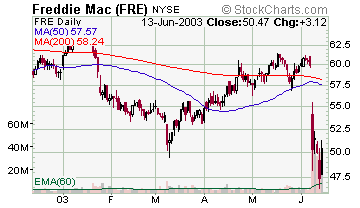 Freddie's
repurchase operation concluded with a record $9.8 billion in multiple
USD Reference Notes bought back between Thursday and Friday. It went better
on Friday. The bulls drove Freddie's shares back up almost 7% in order
to almost fully recover the prior day's loss. It truly amazes me how complacent
investor attitudes are towards it. Their focus quickly shifted to really
important things like the consumer sentiment numbers, and the body count
arising from the latest conflict in Iraq.
Freddie's
repurchase operation concluded with a record $9.8 billion in multiple
USD Reference Notes bought back between Thursday and Friday. It went better
on Friday. The bulls drove Freddie's shares back up almost 7% in order
to almost fully recover the prior day's loss. It truly amazes me how complacent
investor attitudes are towards it. Their focus quickly shifted to really
important things like the consumer sentiment numbers, and the body count
arising from the latest conflict in Iraq.
But I guess that's the idea.
| "We think there's going to continue to be uncertainty surrounding this market as long as we don't know details of the criminal investigation, and during this period where we have to wait for the restatement of earnings sometime in the third quarter," said Ryan. Late Friday, U.S. Rep. Richard Baker said he was preparing legislation that could double funding for the Office of Federal Housing Enterprise Oversight, which regulates Fannie Mae and Freddie Mac. He aims to hold Congressional hearings on oversight on June 25 |
I think the main question surrounding this issue concerning investors is what new standards will evolve?
Determining the answer includes estimating how policymakers will respond, which can only be determined by news that hasn't been revealed yet?
For instance, is the news going to get bad enough that the legitimacy of the institutions is thrown into the spotlight? Or just bad enough to justify a new Congressional mandate for the Fed? Or will regulators overcompensate in order to satisfy the various lobbying interests? Or are we all blowing this out of proportion?
The actions by analysts so far indicate that the thinking is this is not a matter that will affect the company's credit worthiness, because there is still an implied government guarantee, backed by a lender of last resort. They see it as a simple earnings matter.
Their thinking is that the news will at worst get bad enough to justify more government involvement, in one way or another, which I presume the majority of people today think is good, er, bullish.
But when there's a criminal investigation, and there's funny numbers going on, regardless of the implied guarantee, it holds implications for credit worthiness all right. Would you lend your money to someone you didn't trust? It depends perhaps only on the price.
Thus the consensus conclusions are probably premature, and clearly bullishly biased. They see the truck coming, head on, rolling over their peers who too are frozen in astonishment - at the speed of the oncoming head lights.
The attitude is complacent.
I remember the Bre-x Minerals scandal when it was first a rumor. The market believed the rumor was a hoax perpetrated by the bears for some time afterward - even while its shares collapsed. The bulls saw it as an opportunity. I know, I argued with some of them. It wasn't until a key geologist in the scheme was reported to have thrown himself to his death out of a chopper that people began to really believe something wasn't quite right.
Believe me, people don't want to know that the GSE's are but the modern day version of John Law's grand monetary scheme, the Mississippi Bubble perpetrated almost 300 years ago. They still prefer the euphemism "policy" to "scheme," or to "fraud."
As far as people are concerned today, corruption at any outfit can end by replacing the entire executive branch, adding better rules, and in the case of the GSE's, renewing confidence in the principles of the underlying "scheme."
Scenario #1 Plays Out
Scenario number one (as per yesterday's report) played out on Friday:
i.e. stocks fell, yields fell, the dollar fell, and gold rose. Who would
have guessed.
Though I'm still absolutely amazed at the power of the bond rally. All the maturities (US Treasury) went to new highs in price, and new lows in yield on Friday.
Somehow, the Fed's promised yield cap has created a circumstance where the bond markets are now ignoring ANY bullish equity or economic news in their valuation of Treasuries whatsoever, yet they continue to dance higher on every piece of bearish news that seems - in isolation - to reassert the probability of a wider Fed mandate, or another rate cut.
I'm not saying there's much good news in the first place. But what I'm saying is that the good news is being ignored by the bond market, but fully factored by the stock market.
This bifurcation isn't new, since we've talked about it for many months now. I'm just trying to emphasize how extreme it's gotten, especially since in our view the inflation argument is left out of the bond's valuation altogether, while most of the bad news sustaining the bond rally is left out equity valuations almost altogether.
Amazing.
Oil, Wheat Liquidation Cloud Bearish
USD Developments
There is a subtle shift away from
the insanity this week, however, in most markets outside of the bond.
The US dollar ended the week down against most currencies, and despite
gold's early week slide.
The volatile South African Rand gained 3.7% for the week ended Friday June 13th. The move had minor technical significance though.
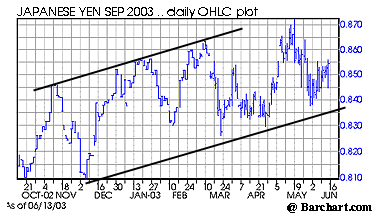 The
best performing major liquid currency against the greenback turned out
to be the Swiss Franc, which gained almost 2 percent on the week, followed
by the Japanese yen (1.36%), and the Canadian Loonie (1.32%). The
Euro gained 1.15%.
The
best performing major liquid currency against the greenback turned out
to be the Swiss Franc, which gained almost 2 percent on the week, followed
by the Japanese yen (1.36%), and the Canadian Loonie (1.32%). The
Euro gained 1.15%.
The Swiss franc could be looking to lead the European currencies through their 1998 highs against the US dollar, which would be a very significant technical development.
Consequently, gold's sharp $10 sell off (Tuesday) grew harder to explain as the week wore on. The US dollar remained within its tight three week trading band, but the bias ended the week with a distinctly bearish tone. Gold prices attempted to recover, but they still ended down almost 10 points this week.
Silver prices, on the other hand, recovered their midweek slide, and finished marginally higher. Gold shares too continued to charge higher (more on that below).
But then the picture becomes murkier.
The sharp slide in commodities that began Monday (for some) accelerated into a more broad based sell off by the end of the week - the opposite of what was going on in the precious metals. The CRB was only off 1.3%, but more than half of that was lost Friday.
Not all commodities were down. Lumber, Coffee, Cotton, Silver, and some of the grains were marginally higher for the week.
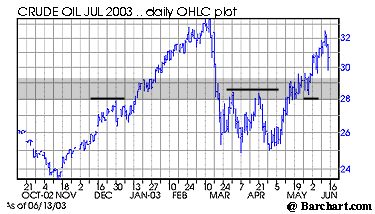 Oil
and Wheat prices were headed for a strong week until Friday - they both
plunged sharply.
Oil
and Wheat prices were headed for a strong week until Friday - they both
plunged sharply.
In our view, these are key commodities for the world today, and are as good as any currency is as a barometer of dollar sentiment and value (though they are capital goods, unlike gold, so you have to account for more non-monetary factors than you do in gold).
NYMEX Crude fell almost 3% on Friday, after falling 3% Thursday, but ended the week down only 2% owing to a higher high mid week. Wheat prices were strong most of the week, but gave it all back Friday - the nearest contract fell 6% after smacking up against resistance at the 340 neckline.
Friday's long liquidations in these commodities were ugly but so far have only minor significance in the daily chart. On the contrary, I think it's worthwhile to note that the jaunt up to 340 in the wheat contract was significant in itself. It puts a little more bullish bias in the chart.
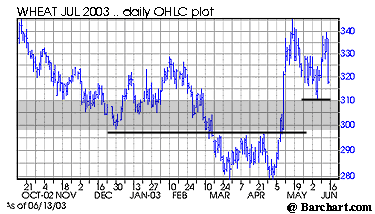 That
could change this coming week if there is unfinished business here though.
It's hard to tell.
That
could change this coming week if there is unfinished business here though.
It's hard to tell.
Wheat futures ended on their lows of the session; they were down all day, but selling accelerated in the hard red winter wheat contract in the last hour of trade. Reporters blamed profit taking fueled by short term weather forecasts in light of recent rain falls in the key Midwest belts.
Nonetheless, it will be important to the bullish assessment to see support at around $3.10 / bushel. There was some news that Brazil raised its farm aid budget by 26% for the 2003/2004 year, and Germany and France suspended talks over reforming its farm subsidies until Tuesday. But I didn't get more details on that.
The International Energy Agency (a lobbyist for oil import dependent countries) said it found another 79 million barrels of oil supply in its estimate of (industrialized) world oil stocks, which has been revised up to 2.439 billion for monthend April.
It was a good excuse to take profits no doubt. Notwithstanding the noise, the IEA itself admitted "the revision did not change its view that global markets were tight. Stocks are still 157 million barrels, or 6.5 percent, below 2002 (Reuters)."
If the oil market really is strong, or tight, this news should have already been absorbed by Friday's liquidation. No, I don't think the PPI news affected trade here because gold was up.
Producer prices fell 0.3% in May. Gold's action on the news in fact was encouraging. It was brushed aside.
Gold tends to be a leader in the monetary argument for revaluation accompanying the typical bust cycle, and that includes the current one. So we have to put more weight on the other factors (other than monetary factors such as inflation/deflation) driving commodities lower this week - since gold ended the week stronger, and the dollar slid against major currencies regardless.
Gold Shares Are Set to Break Out, Big
The short term looks intriguing.
Next week, stock bulls will get their first serious taste of second quarter profit outlooks and/or confessionals. Last week ended bearish for the dollar, and maybe gold is just going to break straight out now if the broad market turns down.
The bulls (Dow, etc.) will no doubt say it's an overdue "correction." The funny thing is, most bears are likely saying that about this whole post war rally.
Despite our unyielding bearish stock market outlook, however, the picture here too was murky - in its implication for the dollar and gold - but mostly ended in our favor this week.
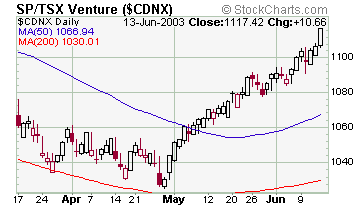 The
Nasdaq, Transports, and small cap averages (continuing from Thursday's
theme) ended flat to down on the week, but the Dow Utilities, Industrials,
NYSE composite, and Treasuries continued higher.
The
Nasdaq, Transports, and small cap averages (continuing from Thursday's
theme) ended flat to down on the week, but the Dow Utilities, Industrials,
NYSE composite, and Treasuries continued higher.
It might indicate some defensive maneuvering at the margin.
Canadian shares were mostly down this week, except for the S&P/TSX Venture Capital index, which boasts a few gold stocks in it.
Indeed, most US gold sector indexes were up on the week, thanks largely to Friday's sharp gains, where the AMEX Gold Bugs index and the XAU registered higher highs to extend a three month rally, and despite the correction in gold prices - which may be about to end.
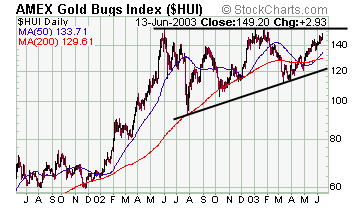 Except
for a few slackers, most all gold stocks were up both Friday, and for
the week.
Except
for a few slackers, most all gold stocks were up both Friday, and for
the week.
Gold shares have been the weak point in the gold sector argument for the better part of a year - because they got so ahead of themselves in the run up to June's high last year mainly, we'd argue.
But we're noticing a change now. We already noticed their proclivity towards leadership (over bullion) during April and May, but now even as gold prices fall, and the Dow rallies, they're still rallying!
If I'm not mistaken, it sure looks like they want to break out - see charts.
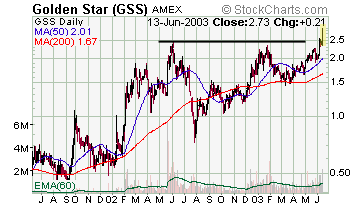 Goldenstar
Resources led the way Friday by rising 8% to pierce last year's highs
on a sharp uptick in volume.
Goldenstar
Resources led the way Friday by rising 8% to pierce last year's highs
on a sharp uptick in volume.
Gold stocks like Anglogold, Goldcorp, Randgold, and Glamis Gold already confirmed January's new high in gold prices, and have maintained a well-defined uptrend in the long term charts. So we consider them the traditional leaders.
But Newmont is gunning for this spot again after a hiatus last year. Bulls poked away at last year's high a week ago Friday, but Newmont's shares then dipped during the week. You know our position on Newmont - our target this year is $40 (no chart today).
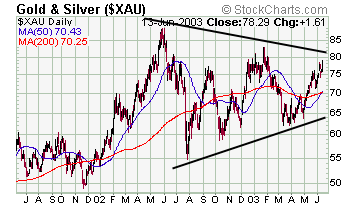 The
stock was a special situation last year, because the market began to price
it as a hedger just when it was in the midst of becoming a non-hedger.
The
stock was a special situation last year, because the market began to price
it as a hedger just when it was in the midst of becoming a non-hedger.
It's now the largest gold producer in the world, and unlike the others in its league, it has no hedges for all practical purposes. And so maybe it's time anyway, for this stock to take its rightful place as leader of the free market world on the chart.
Spoken like a true bull...
Geo Politics Remain USD Bearish
Brace yourself for bad news on the geopolitical
front. The United States President is under fire for the handling of documents
that helped the administration prove Saddam could build a nuclear weapon
within a year, and thus justified the push for war. I'm not comfortable
with all the facts on this, but suffice to say that the validity of a
key document is reportedly questionable. Left unanswered, it only adds
to the Freddie Mac impetus for bearish dollar trade.
However, in addition to that, the administration has got a hot potato on its hands. The Israeli-Palestine situation looks uncomfortably hot. Both sides are increasingly angry with each other amid increasing violence, and neither seems willing to work towards peace. It's always bad when America has to pick sides in something like this to begin with. But today, during the ongoing war in Iraq, the stakes are higher, and getting higher. Each time the US government loses a friend, it creates a new dollar offer.
The writing on the wall for markets beyond the short term remains clear. It's just a matter of picking your entry point. Maybe it's just a matter of days.